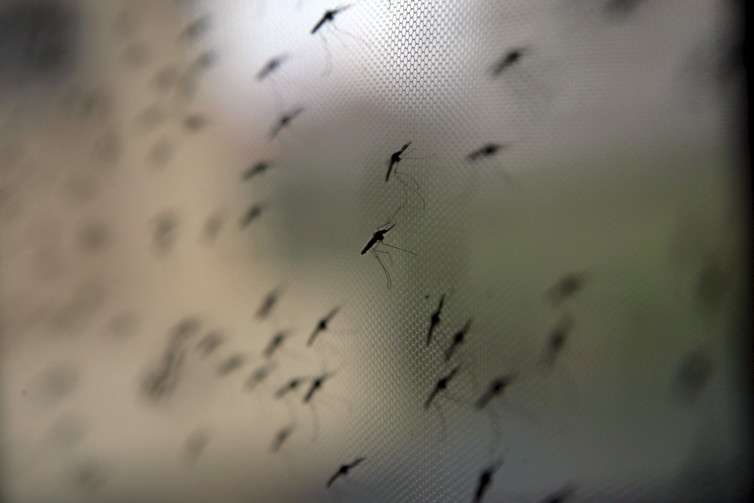Malaria—should we abandon insecticide-treated bednets?

In Africa, some malaria-carrying mosquitoes have found ways to survive exposure to insecticides. This means that bednets treated with these chemicals may become less effective at preventing malaria. A new study we've published in PNAS shows that although these resistant mosquitoes don't die immediately on contact with insecticide-treated bednets, their risk of death in the days and weeks following contact is greatly increased. As a result, the opportunity for these mosquitoes to transmit malaria to a human drops by two-thirds.
There were over 200m cases of malaria in 2015, causing more than 400,000 deaths, mostly in Africa. While these numbers are still shockingly high, since 2000, the rates of malaria have been decreasing dramatically, largely due to the widespread use of insecticide-treated bednets.
Such bednets help control malaria in two different ways: by providing a physical barrier between the human and the disease infected mosquito; or by turning the person sleeping under the bednet into a deadly mosquito trap, where the mosquito is lured towards the scent of the sleeper. The mosquito then flies into a wall of insecticide that not only stops it from biting but kills it too. So impregnating bednets with insecticide has been very useful for controlling malaria mosquito populations.
The problem with the widespread use of insecticide-treated bednets is that many mosquitoes have now become highly resistant to these chemicals. Insecticides are designed to kill mosquitoes immediately on contact, so when more than 10% of them are still alive in the day following exposure we know they are getting resistant to insecticides.
To worsen the problem, there is only one type of insecticide that can be safely used to treat bednets. So when mosquitoes become fully resistant, we could enter an era where our primary weapon against malaria can no longer be used and the public health gains achieved so far reversed.

Thinking beyond 24 hours
While the spread of insecticide resistance is of great concern, our results indicate that by classifying mosquitoes as resistant only on the basis of mosquito survival in the 24 hours following exposure, we are overseeing important long-term costs arising from exposure to insecticides. By rearing thousands of mosquitoes in the laboratory and exposing them to nets impregnated with insecticides we were able to closely monitor the longer-term fate of resistant mosquitoes that encounter an insecticide-treated bednet. We found that while they survive the first day, there were consistent reductions in their daily survival for the rest of their lives. Over the life time of the mosquito, these small but consistent reductions combine to reduce their lifespan by half.
The malaria parasites needs at least nine days to mature inside the mosquito before they can be passed onto a human, so these longer-term survival reductions could have a big impact on malaria transmission.
In total, we estimated that contact with a treated bednet can reduce the transmission potential of even highly resistant mosquitoes by two-thirds. This may explain why bednets appear to be effectively controlling malaria in areas of Africa where mosquito populations are highly resistant. So for now, it would be premature to abandon this strategy.
Unfortunately, we also found evidence that these longer-term impacts on mosquito survival may be temporary and could disappear as mosquitoes develop more intense levels of resistance. This is why there remains a huge urgency to find alternative methods to control malaria mosquitoes.
By making new insecticidal products - or finding alternative or other complementary solutions - we may be able to start killing these resistant mosquitoes again. As we wait for these developments, we should continue to use mosquito insecticide-treated bednets. Despite the rapid spread of insecticide resistance, they are still the most effective method to prevent malaria transmission.
More information: Mafalda Viana et al. Delayed mortality effects cut the malaria transmission potential of insecticide-resistant mosquitoes, Proceedings of the National Academy of Sciences (2016). DOI: 10.1073/pnas.1603431113
This article was originally published on The Conversation. Read the original article.
![]()















